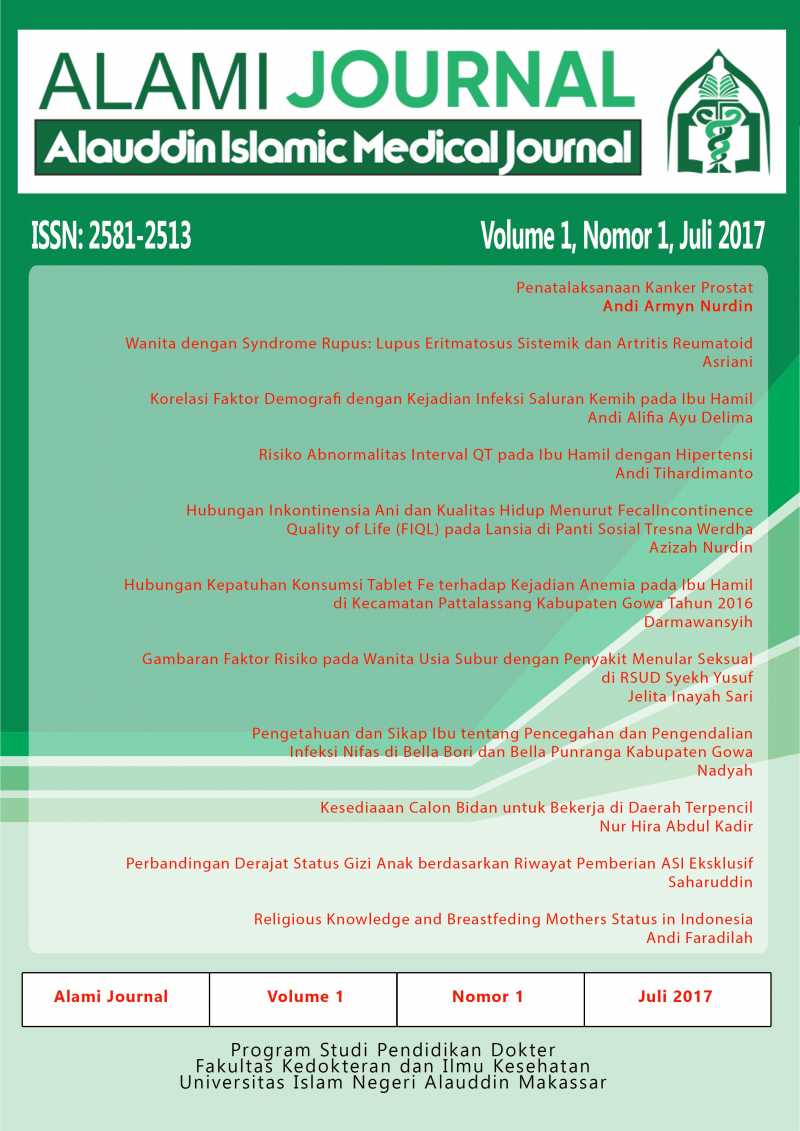KESEDIAAN CALON BIDAN UNTUK BEKERJA DI DAERAH TERPENCIL
Abstract
Various factors affect the willingness of future midwives to work in remote areas. Individual characters, self-motivation, education and incentives are among things considered to determine that willingness. This descriptive study compares final-stage students from urban and rural midwiferyeducational institutions in terms of their willingness to accept rural posting, the reasons for the willingness, the expectation towards and the duration of the assignment. Questionnaires were distributed to the two groups, 116 students from rural institution and 85 students from urban institution. The study found that the majority of respondents from both groups were 21 years of age or older and had a GPA of 3 or more. The respondents from both institutions mostly said they were willing to work in remote areas. The most dominant reasons for that were to serve the benefit of society and to add experience. Most students from both institutions expect the fulfillment of facilities and infrastructure to work. Duration of 1 and 2 years of assignment attracts respondents in both institutions but most rural students choose a period of 3 years. This research is expected to contribute to improving the regulation of midwife remote placement and also that future research can explore much deeper aspects such as respondents’ characteristics and their relation to the' willingness for doing rural posting.
References
Ditjen Bina Gizi dan KIA. Profil Kesehatan Indonesia 2012. Jakarta: Kementerian Kesehatan RI; 2013.
Dinas Kesehatan Provinsi Sulawesi Barat. Profil Kesehatan Sulawesi Barat 2012. Mamuju: Dinas Kesehatan Sulbar; 2013
Dinas Kesehatan Provisnsi Sulawesi Selatan, Profil Kesehatan Sulawesi Selatan 2012. Makassar: Dinas Kesehatan Sulsel; 2013
Afrisal, S & Yasir, H. Hubungan kemitraan bidan dan dukun terlatih dengan peningkatan cakupan persalinan di wilayah kerja Puskesmas Aska Kabupaten Sinjai. Jurnal Kesehatan 2013; 03 (02):31
Pusat Perencanaan dan Pembangunan Departemen Kesehatan Republik Indonesia. Profil Kesehatan Indonesia 2007. Jakarta; Kementerian Kesehatan RI; 2007.
Fikawati S, Musbir W, Syafiq A. Faktor-faktor yang berhubungan dengan kesediaan bidan di desa untuk tetap bekerja dan tinggal di desa di kabupaten Tangerang propinsi Banten. Makara Kesehatan. 2004; 8(1): 7-13
Manalu HSP, Rachmalina S, Prasojo, Suharjo. Persepsi bidan di desa terhadap tugas dan fungsinya di kabupaten Tangerang. Media Litbang Kesehatan. 2006: 16(1)
Thammatacharee N, Suphanchaimat R, Wisaijohn T, Limwattananon S, Putthasri W. Attitudes toward working in rural areas of Thai medical, dental and pharmacy new graduates in 2012: a cross-sectional survey. Human Resources for Health. 2013 (Dikutip 3 Juli 2017]; 11:53. Diakses dari https://doi.org/10.1186/1478-4491-11-53
Johnson GE, Blinkhorn AS. Student opinions on a rural placement program in New South Wales. Australia Rural and Remote Health (Internet) 2011 [Dikutip pada 2 Agustus 2017]; 11: 1703. Diakses dari: http://www.rrh.org.au/articles/subviewnew.asp?ArticleID=1703
Walker JH, DeWitt DE, Pallant JF, Cunningham CE. Rural origin plus a rural clinical school placement is a significant predictor of medical students’ intentions to practice rurally: a multi-university study. Rural and Remote Health (Internet) 2012 [Dikutip 3 Agustus 2017]; 12: 1908. Diakses dari: http://www.rrh.org.au/articles/subviewnew.asp?ArticleID=1908
Mullei K, Mudhune S, Wafula J, dkk. Attracting and retaining health workers in rural areas: investigating nurses’ views on rural posts and policy interventions. BMC Health Services Research. 2010 [Dikutip 3 Agustus 2017]; 10(Suppl 1):S1. Diakses dari:https://doi.org/10.1186/1472-6963-10-S1-S1
Anggasari Y , Kartasurya MI, Suparwati A. Faktor-faktor yang berhubungan dengan kinerja bidan dalam pelayanan kontrasepsi iud puskesmas kota Surabaya. Jurnal Manajemen Kesehatan Indonesia . 2013; 1(2)
Chaudhury N, Hammer JS. Ghost doctors: absenteeism in rural Bangladeshi health facilities. World Bank Econ Rev. 200 [Dikutip 3 Agustus 2017]; 18 (3): 423-441. Diakses dari: https://doi.org/10.1093/wber/lhh047
Kruk Margaret E, Johnson Jennifer C, Gyakobo Mawuli, Agyei-Baffour Peter, Asabir Kwesi, Kotha S Rani et al . Rural practice preferences among medical students in Ghana: a discrete choice experiment. Bull World Health Organ [Internet]. 2010 May [Dikutip 2 Agustus 2017] ; 88( 5 ): 333-341. Diakses dari: http://www.scielosp.org/scielo.php?script=sci_arttext&pid=S0042-96862010000500010&lng=en. http://dx.doi.org/10.1590/S0042-96862010000500010
Once an article was published in the journal, the author(s) are: granted to the journal right licensed under Creative Commons License Attribution that allows others to share the work with an acknowledgement of the work's authorship. permitted to publish their work online in third parties as it can lead wider dissemination of the work. continue to be the copyright owner and allow the journal to publish the article with the CC BY-NC-SA license receiving a DOI (Digital Object Identifier) of the work.


